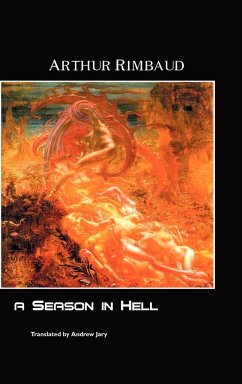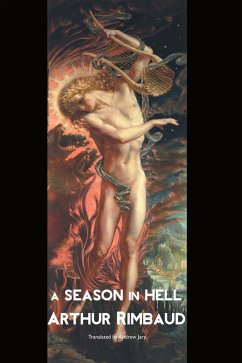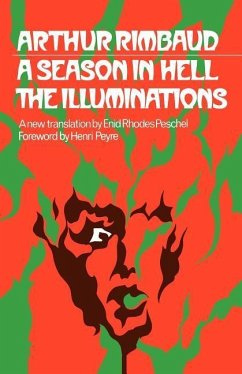
A Season in Hell
An English Translation from the French
Versandkostenfrei!
Versandfertig in 1-2 Wochen
11,99 €
inkl. MwSt.
Weitere Ausgaben:

PAYBACK Punkte
6 °P sammeln!
Arthur Rimbaud wrote a few pieces that set french poetry aghast around 1873. He'd taken to wandering Europe in lieu of university. His teachers hated him. There was a sort of subtle but perverse defiance to his work. He would create new words to describe the world around him, and produced pages of rhyming latin verse in his mathematics class while taking notes. For a time he produced latin homework for his fellow students and appeared, for a time, to raise the general standard. He criticized every popular structural form and his writings provided a new basis for creative literature in Europe. ...
Arthur Rimbaud wrote a few pieces that set french poetry aghast around 1873. He'd taken to wandering Europe in lieu of university. His teachers hated him. There was a sort of subtle but perverse defiance to his work. He would create new words to describe the world around him, and produced pages of rhyming latin verse in his mathematics class while taking notes. For a time he produced latin homework for his fellow students and appeared, for a time, to raise the general standard. He criticized every popular structural form and his writings provided a new basis for creative literature in Europe. At the age of 21 Rimbaud renounced writing to explore distant countries. In 12 years he passed through almost 28 countries and amassed a small fortune in gold before complications from a gangrenous leg injury led to his untimely death. He became the first European to travel through northern Ethiopia. Confronted in North Africa by an employer, who told him his adolescent prose was not only alive in Europe but launching a career of its own, is quoted as one histrionic outburst. His former employer, Alfred Barley, wrote: [Rimbaud] would never allow me to mention his former literary works. Sometimes I asked him why he didn't take it up again. All I ever got were the usual replies: "Absurd, ridiculous, disgusting, etc."












